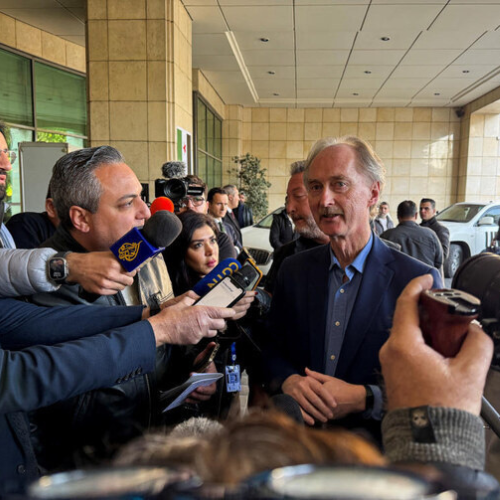At the first United Nations Security Council meeting about Syria since the fall of its long-time leader earlier this month, the UN’s special envoy for Syria delivered a powerful message. He called on countries worldwide to lift the harsh economic sanctions imposed on Syria, which are worsening the hardships faced by its people after nearly 14 years of civil war.
Speaking from Damascus, the envoy painted a picture of a country still struggling, despite the significant political change. The collapse of the former government marked the end of one chapter, but it did not mean the conflict was over. Violent clashes between groups in northern Syria, such as Turkish-backed factions and Kurdish forces, continue to harm civilians, causing death, displacement, and destruction.
The envoy stressed the importance of unity within Syria and the international community’s role in helping the nation rebuild. He emphasized that economic support would only be possible with an inclusive political transition—a process where all voices in Syria, including marginalized communities, are heard.
Economic Sanctions: A Barrier to Recovery
Economic sanctions, originally imposed on Syria over a decade ago, were meant to punish the previous government for its violent crackdown on peaceful protests. These measures targeted both the regime and armed groups associated with terrorism. However, as the country now transitions under new leadership, these restrictions are hindering its recovery.
The UN humanitarian chief also weighed in, urging countries to ensure that sanctions and anti-terrorism measures do not obstruct aid. Millions of people in the country are suffering from one of the world’s worst humanitarian crises. The chief described heart-wrenching details: 17 million people in Syria need help, and over 7 million have been displaced within the country. Food and fuel shortages are rampant, with more than 13 million people facing extreme hunger.
Recent events, including the fall of the previous government, have only added to the chaos. More than a million people were displaced in just two weeks. Humanitarian aid operations have been disrupted, with many warehouses looted and several aid workers losing their lives. In this environment, lifting or easing sanctions could allow more help to reach those in need, the UN officials argued.
A Fragile Transition with Looming Challenges
While the political shift has sparked hope for peace, the road ahead is daunting. The envoy warned of risks if the situation is not carefully managed. Despite improvements in law and order in some areas, there are still active battle lines in parts of the country. He also criticized repeated military strikes by external forces, which threaten Syria’s sovereignty and put civilians at further risk.
US Sanctions Fawaz al-Akhras, Assad’s Father-in-law, Amid Syria Crisis
The envoy’s visit to one of the country’s infamous prisons brought attention to the past government’s brutal treatment of its people. He described horrific conditions in detention centers, emphasizing the need for justice and accountability. Transitional justice—ensuring fair trials and protecting evidence of crimes—is seen as critical to prevent revenge and chaos.
Meanwhile, countries on the Security Council stressed the importance of Syria’s territorial integrity and warned against breaking the country into smaller, divided regions. Some also called for women to be fully involved in building Syria’s future and highlighted the need to continue fighting terrorism.
As the year comes to a close, aid for Syria is critically underfunded. Despite it being the largest aid appeal in the world, donations are at their lowest levels ever. This funding gap threatens millions of people who depend on support for food, medicine, and shelter.
The UN’s message was clear: while Syria’s transition has begun, the challenges are massive, and the international community must act to ensure relief for the people. Whether through lifting sanctions or supporting humanitarian efforts, Syria’s path to recovery depends on global cooperation.


